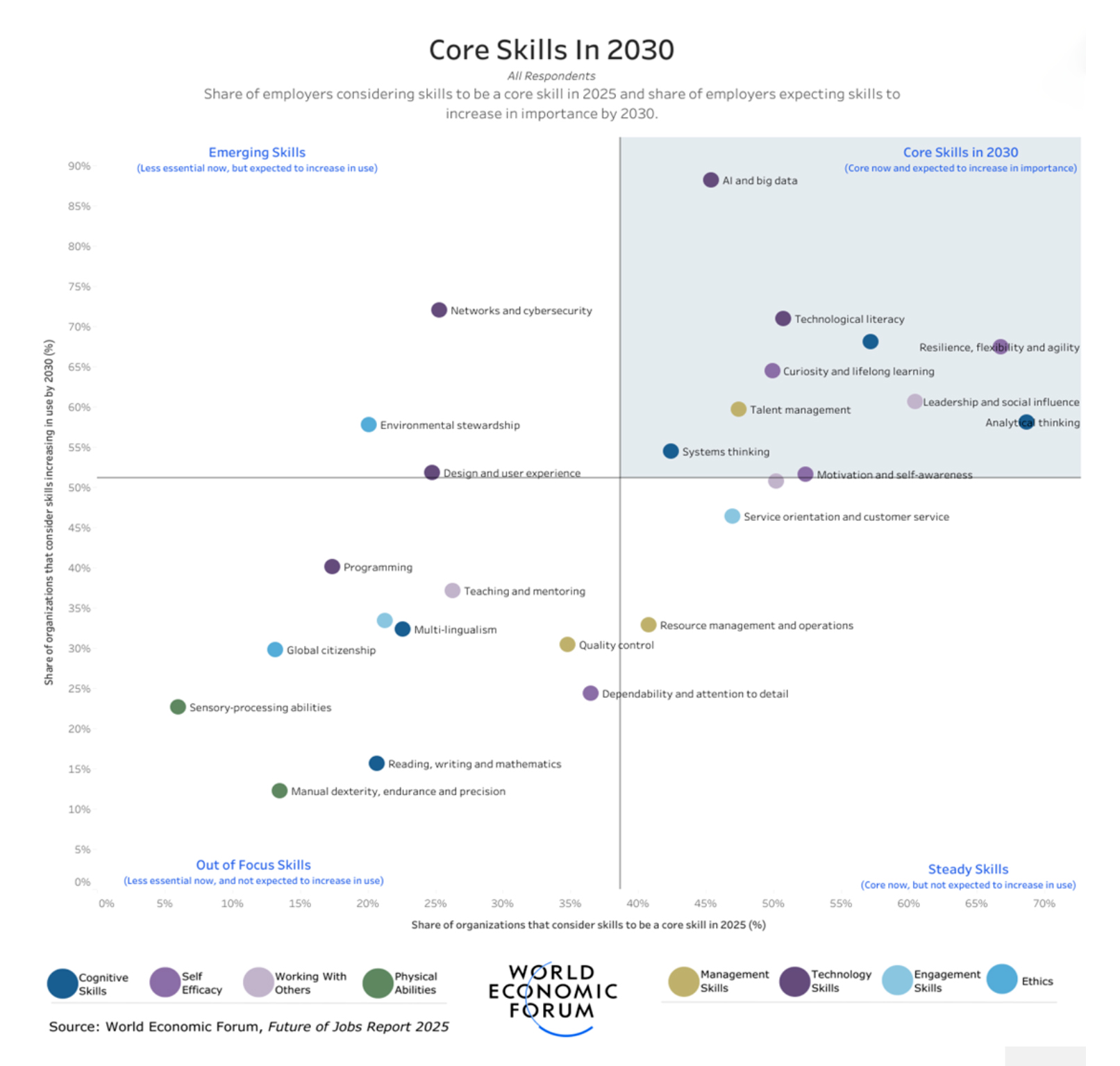
Evolving auditing competencies in a changing landscape
Progress indicator

Reflecting on a report from the World Economic Forum on the changing nature of core skills, Ian Rosam CQP MCQI takes a closer look at how auditing competencies can evolve to face the future.
Auditing is undergoing a transformation, driven by rapid technological advancements, shifting workforce demographics, and changing business expectations. As we move into the latter half of the decade, understanding auditor competence is crucial to staying relevant in the profession. This article explores the competencies that maybe needed for the future of auditing, drawing insights from industry reports and thought leadership.
The changing skillset for auditors
A report from the World Economic Forum (WEF) provides valuable insights into core skills for the future workforce. The analysis includes a quadrant model, highlighting skills that are becoming less essential and those that are increasingly critical:

- Bottom-left quadrant: Skills that are becoming less essential because of automation, artificial intelligence (AI) and robotics – we can see this includes quality control/assurance. This is not saying that the tasks are not needed, just that the skills are becoming non-essential because of the technological changes.
- Top-right quadrant: Core skills that apply across industries, shaping the future of professional roles including the competences needed for auditing.
Examining these trends offers a clearer picture of the evolving nature of auditor competencies.
Traditional skills vs emerging core competencies
Traditional quality control and assurance skills focus primarily on compliance and procedural adherence. These can include the following points.
- Checking adherence to planned arrangements: ensuring that established processes are followed consistently.
- Verifying tangible evidence: reviewing documented requirements and confirming compliance with predefined standards.
- Monitoring outputs rather than outcomes: focusing on whether specific tasks have been completed as required, rather than assessing their broader impact.
In contrast, emerging core competencies require a shift toward dynamic, strategic thinking, such as the following.
- Systems thinking: understanding how the different parts of an organisation interact and influence outcomes.
- Social engagement and leadership: collaborating with stakeholders to assess cultural and behavioural impacts on compliance. A core competence that promotes seeing an organisation or process as a social system
- Data-driven decision-making: using AI and big data to interpret risk indicators and strategic performance drivers.
This shift promotes the evolution of auditing competencies, moving beyond static compliance checks toward a more comprehensive understanding of organisational performance.
Understanding systems thinking in auditing
One of the critical skills highlighted in the WEF report is systems thinking, an approach that considers organisations as complex, interdependent systems rather than isolated components. Unlike traditional auditing, which often focuses on tangible outputs and adherence to predefined standards, systems thinking emphasises:
- analysing interactions between different elements within an organisation.
- understanding how business outcomes are influenced by organisational culture and behavioural patterns.
- managing and solving complex and/or ‘messy’ problems rather than auditing individual parts of a system in isolation of each other, which is quality control and assurance.
This shift signifies a move from a static audit process to a dynamic, outcome-driven approach, where auditors evaluate how multiple factors contribute to business performance rather than just verifying whether specific rules have been followed.
"By moving beyond traditional auditing methods, auditors can add greater value to organisations by identifying the factors that truly drive success."
The role of AI and big data in auditing
Technological advancements are reshaping the way audits are conducted. AI and big data play a significant role in this in several ways.
- Capturing and analysing evidence: AI can process vast amounts of data, identifying patterns in behavioural impacts and assessing cultural influences within organisations.
- Identifying risks and threats: advanced analytics can detect anomalies and potential compliance issues, allowing auditors to focus on strategic risk assessment.
- Enhancing decision-making: AI-driven insights provide auditors with a deeper understanding of organisational performance, enabling more informed recommendations.
Despite these advancements, quality control and assurance remain essential, albeit with a shift in focus. Technology is reducing the need for manual verification, allowing auditors to concentrate on value creation and strategic analysis.
Interplay of leadership and social influence
Leadership and social influence are emerging as fundamental competencies for auditors. These skills facilitate effective stakeholder engagement, ensuring that audits are aligned with organisational objectives and cultural dynamics.
Key aspects include:
- engaging stakeholders: understanding the expectations of different parties involved in the audit process.
- social systems awareness: recognising how cultural and behavioural factors impact compliance and performance.
- talent management: aligning employee behaviour with organisational goals to enhance audit effectiveness.
Traditional auditing focuses on verifying documented processes, but these new competencies enable auditors to assess intangible elements such as employee engagement, leadership effectiveness, and corporate culture.
Concept of value literacy in auditing
A new competency, referred to as value literacy, is gaining prominence. This competency enables auditors to:
- link audit findings to value drivers, such as financial health, reputation, and compliance;
- assess both tangible and intangible evidence to provide a holistic view of organisational performance; and
- offer strategic recommendations that contribute to long-term value creation for the organisation.
By moving beyond traditional quality assurance methods, auditors can add greater value to organisations by identifying the factors that truly drive success.
AI-driven audits and risk assessment
By analysing data against performance drivers, AI can provide deeper insights into how organisations achieve their objectives. This approach extends beyond traditional compliance checks, offering a more strategic perspective on organisational effectiveness and efficiency.
Shift from outputs to outcomes
One of the fundamental changes in auditing competencies is the shift from focusing on outputs (compliance with documented procedures) to outcomes (business performance, risk and threat mitigation, and cultural alignment). This transition includes:
- moving beyond simple checklists to assess organisational resilience and adaptability;
- using predictive analytics to identify trends before they become compliance and performance issues;
- evaluating behavioural drivers of performance rather than just checking adherence to set documented processes or planned arrangements.
This approach promotes greater business value by allowing auditors to provide insights that enhance decision-making, rather than simply ensuring compliance.
Benefits of developing future auditor competencies
As auditing evolves, developing new competencies offers significant benefits for both organisations and auditors.
For organisations
- Increased efficiency: streamlined audit processes reduce interruptions and improve accuracy.
- Enhanced risk identification: AI-driven audits detect hidden risks, allowing for proactive management.
- Stronger decision-making: actionable insights support informed financial planning and strategic improvements.
- Future-proofing and innovation: adapting to emerging technologies ensures competitiveness in a rapidly evolving business landscape.
For auditors
- Improved analytical capabilities: AI tools help auditors focus on critical areas without compromising quality.
- Stronger critical thinking skills: ability to identify trends and anomalies that traditional audits might overlook.
- Enhanced communication and collaboration: effective stakeholder engagement ensures understanding and implementation of audit recommendations.
- Ongoing professional development: digital literacy and continual learning enable auditors to stay ahead in their field.
Conclusion
The future of auditing is dynamic, requiring a blend of traditional expertise and emerging skills. While quality control and assurance remain fundamental, auditors must embrace systems thinking, AI integration, leadership and value literacy to enhance their impact. The transition to these new competencies is not merely about compliance but about adding value to organisations in a way that is predictive, and insightful.
By fostering debate and discussion around these competencies, the auditing profession can prepare for a future that is both technologically advanced and deeply human-centric.
Have your say!
If you have insights or examples of how auditing competencies are evolving, we encourage you to join the conversation by contacting the CQI’s Audit special interest group or [email protected]
Quality World

Get the latest news, interviews and features on quality in our industry leading magazine.



